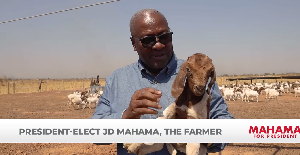A member of the Parliamentary Select Committee on Works and Housing, Hon. Eric Opoku, has revealed that a recent tour by the committee to a number of companies in the country points to a serious threat to the government?s policy of private sector development.
The legislator says a number of companies that were offering employment to hundreds, if not thousands, of Ghanaians, were currently on the brink of collapse as a result of what he termed the unfair policies of government.
Raising the concerns after the tour by the parliamentary group, the legislator said more and more companies were overburdened by a myriad of taxes, which had forced most of them to increase the consumer prices for their products, culminating in low demand for the local goods.
According to him, a couple of business entities and manufacturing companies that were visited in the Tema municipality were gradually folding up, with some of them threatening to sack most of their staff within the next couple of months if conditions remained the same.
The MP, who represents the Asunafo South constituency at the National Assembly, told The Chronicle in an interview that at the Crocodile Matchet Company, Ghana?s pioneer cutlass manufacturing company, the revelation of the managing director was worrying.
Hon. Opoku revealed to the paper that officials of the company were very bitter about the way taxes imposed on them were gradually drawing the company to a virtual collapse, adding that the laws of the Value Added Tax (VAT) exempted manufacturers of agricultural inputs from the payment of VAT, to make the prices of such inputs comparatively lower and affordable to farmers.
The legislator said he was therefore surprised to hear from officials of the company that the company was forced to pay VAT since, according to him, importers of cutlasses were exempted from the payment of VAT for the same reason that cutlass was a basic agricultural input.
According to him, since his constituency was predominantly an agricultural one, he was interested in issues related to the prices of farm inputs.
He said he had failed to understand why imported cutlasses were selling lower than the locally manufactured ones, stating he was taken aback when he came to terms with the fact that the state was rather subsidizing imported agricultural inputs by way of VAT exemptions while the local manufacturers were compelled to keep their prices high as a result of the payment of VAT.
?Due to the current situation of allowing people to import cutlasses without paying VAT while local ones are made to pay, even cocoa inputs stores that were set by the government to provide farming inputs to farmers at a subsidized cost are now importing cutlasses instead of buying from the local companies,? he revealed.
?Some of these input stores in my constituency have been selling only imported cutlasses, which are obviously inferior as compared to the local ones but because the imported ones are sold at a lower price and thus affordable, farmers in my constituency are forced to go in for the inferior cutlasses,? Hon. Opoku explained.
The legislator further complained that even though government had been making a lot of noise about the relevance of the private sector towards the country?s development, it had failed to provide the necessary policy direction to boost the development of the private sector, hence the collapse of a number of local industries.
He said some of the policies of the government were very inimical to private sector development and opined that if serious efforts were not made to reform most of the policies on the development of the private sector, the nation could soon lose most of her private companies that offer employment to many people.
It would be recalled that over the last couple of months, a number of textile companies have declared their inability to continue with their operations as a result of what they say had been an unfavorable environment for their operations.
These companies, which include major textile companies like Juapong Textiles and Ghana Textile Print (GTP), have been hit, resulting in the increase in the number of unemployed people in the country.
Click to view details



Business News of Wednesday, 13 July 2005
Source: Chronicle
















